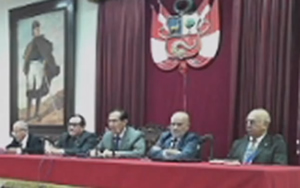Lima, Peru BRICS Seminar
Peruvian Military Center Hosts BRICS Seminar,
Featuring Helga Zepp-LaRouche
by Dennis Small
May 2015
 The panel from ADECAEM, the sponsors of this videoconference. |
Overview (below)
Speeches:
Gen. Juan Luis Autero VillagarciaDennis Small
Luis Vasquez
Dialogue
Overview
May 28, 2015 (EIRNS)--Retired Gen. Juan Luis Autero Villagarcia, president of the Association of Alumni of Peru's Superior War College (ADECAEM), opened today's international videoconference in Lima, “The BRICS Alternative and the Development of Peru and South America” with a ringing statement that the future lies with the BRICS, and Peru has a role to play in that future.
“Brazil, Russia, India, China and South Africa: the BRICS take hold of a historic challenge for tomorrow's future,” Gen. Autero stated. “They are building a New World Order of progress. It is, in short, the demonstration of the new capabilities of countries united for energetic development. Asia, South America and Africa are participating in this challenge for humanity today. Peru feels greatly associated with this, and Peru has the capability to intervene in the development of infrastructure,” he added, citing “the Brazil-Peru train driven by the Republic of China.”
The conference occurred literally two days after Chinese Premier Li Keqiang completed a four-country tour of South America, including Peru, centered on the construction of such a trans-continental railroad.
A pre-recorded video discussion with the former Vice President of the China Institute of International Studies (CIIS), recently retired diplomat Dr. Liu Youfa, was then played, setting out a Chinese view of the perspectives for Chinese-Ibero-American relations, in the context of world development. Dr. Liu then took eight questions from the audience, answering live from Beijing by telephone the concerns and interests raised. Each time in different ways, he emphasized a unified concept: that Ibero-America and China, alike, have risen up the ladder of industrial development, and their relations must change accordingly, and the critical importance for that, of the construction of a transcontinental railroad across South America, a dream which goes back to South America's forefathers. I have visited some ten Ibero-American countries, and I know many need a national and regional transportation system, in order to fulfill the dream of “rejuvenating” Ibero-America, he stated.
China's development offers a lesson for Ibero-America, he elaborated. Decades ago, China began with foreign direct investment in the country. But China then built the rail, water, air transportation systems required to establish a national economy; these systems were the necessary pre-condition for the last 20 years of national development. Now the strategic decision has been taken by three governments (Peru, Brazil and China) to build a transcontinental railroad across South America. This railway will not just allow Peru to export its products to China, but, through the One Belt/One Road project which China is creating, an enormous opportunity, extending through all of Asia, to Europe and Africa, is opening up for Peru! But, he added a bit of friendly advice, also: you must be sure to find out what products you have that these nations want to buy from you.
 The audience at this videoconference. |
The conference then received a global strategic briefing, “The Silk Road Becomes the World Land-Bridge,” delivered in a videotaped presentation by Schiller Institute founder Helga Zepp-LaRouche. A notably high-level, live dialogue with Zepp-LaRouche then followed by Skype hook-up, as people battled to understand the idea that the world could be ordered around the concept of mutual interest and harmony, rather than one against all. People were provoked by Helga's discussion of Confucius, with one person admitting he knew little if nothing about it, and asking, wasn't it a religion?
After developing the coherence between the thinking of Confucius and Cusa, even though it appears Cusa is little known in China today, Zepp-LaRouche responded to a question about the greens, who are already beginning to mobilize against the transcontinental train, by developing the concept of Natural Law, and Man's role in the anti-entropic universe, vs. the oligarchic view of Man. We face an existential crisis, she said, and it is existential, which can only be overcome if we change how we think, and operate from the future. What do you want Peru to be 10, 20, 50, 100 years from now? What do you want Latin America to be? We must think like poets, she said.
Zepp-LaRouche was followed by a Skype presentation by EIR's Dennis Small, on “Why the U.S. should reject the TPP and join the BRICS,” and a discussion by EIR's Peru representative Luis Vasquez (who also chaired the conference) on Peru's role in Ibero-American integration and the World Land-Bridge.
